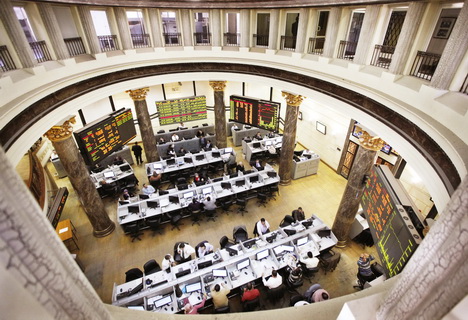The strong activity of Global Depositary Receipts (GDR) during 2016 has caused the statistics of the Egyptian Stock Exchange (EGX) to face a new challenge, making it difficult to rely on them as the main indicators in analyzing the performance of the EGX.
GDR’s inability to accurately state the buying and selling operations of the various segments of investors makes it challenging to determine their attractiveness to Arab and foreign investors.
While risks surround the EGX because of an expected decline in the Egyptian pound’s value, as well as the difficulties that have faced foreign investors in the EGX before March 2013 in terms of converting the output of the selling operations due to the lack of US dollar availability, the latest EGX statistics reveal that foreigners have recorded a total amount of purchases worth EGP 2.350bn, with EGP 1.412 by non-Arab foreigners and EGP 0.9376bn by Arabs.
This paradox has raised questions about ways of increasing foreigners’ purchases, despite the risks and the lack of economic incentives with a continuous increase of interest rates, which can result in losses similar to the 2.25% loss in the EGX 30 index last week.
According to executives in securities brokerage firms, the new element that has recently showed an inability to accurately deliver information about the trends of Arab, foreign, and Egyptian investors is the trading of GDR, which has been exceptionally active throughout the past period.
Traders in the capital market have explained that the trading of foreign investors highlights a trend towards purchases, whereas their trading tends to be of a selling nature. Foreigners convert stocks to global depositary receipts in order to sell them in the London stock Exchange for doubled amounts compared to the EGX.
The trading system in the EGX then records the operations of purchasing stocks without including any data about the operations of depositary receipts that take place abroad, given that this is what foreigners resort to in order to exit the Egyptian market without having to deal with the lack of US dollar availability.
GDRs are known to be financial instruments derived from the registered stocks in the EGX, with the goal of providing trading opportunities for companies in several international stock exchanges, including London, New York, and Luxembourg. Each receipt equals a specific number of stocks.
Apart from the impact of GDRs on the accuracy of the segments of traders in the stock exchange, companies using the off-shore system abroad also cause a state of inaccuracy in statistics. Although many of them were established by Egyptian investors, they are registered in the stock exchange as foreign establishments because they were initially established abroad.
For his part, Mohamed Fathallah, managing director of Al-Tawfik for Securities Trading, said that current trading data includes inaccurate numbers in terms of foreign and Arab investments in the stock exchange.
He explained that the market has been witnessing indirect exiting of foreigners and Arabs since April through the conversion of stocks to GDRs. Nevertheless, trading data still shows intensive purchases by foreigners and Arabs.
Fathallah went on to explain that the trading system in EGX records foreigners’ stock purchases, but at the conversion of stocks to GDRs with the aim of selling them, no data whatsoever is recorded in EGX about the operations, since they are carried out abroad.
He stressed that in the case of foreigners using part of the output of selling GDRs in purchasing Egyptian stocks, they are added to previous foreign purchases, which increases the amount of purchases unrealistically, due to the existence of indirect selling operations through GDRs.
Fathallah pointed out that in the case of including data of GDR sales abroad, it will be found that they are twice as much as the purchases of Egyptian stocks by foreigners and Arabs.
In EGX, there are 14 registered companies that own GDRs. They include Ezz Steel, the Commercial International Bank (CIB), Global Telecom Holding, Telecom Egypt (TE), Hermes Holding Company, Lecico Egypt, Pachin, Suez Cement Company, REMCO Tourism Villages Construction Company, Orascom Telecom Media and Technology Holding (OTMT), Edita Food Industries, GB Auto, Palm Hills Development, and Naeem Holding.
For his part, Mohamed Maher, chairperson of Prime Holding for Financial Investments and vice chairman of the Egyptian Capital Market Association (ECMA), said that operations of foreigners’ purchases over the past three months were met with an intensive conversion of GDRs with the goal of selling them abroad.
He added that this issue is clear in the near depletion of the maximum limits of the GDR percentage in capital by CIB and Edita.
Maher noted that the reality of the operations is that foreigners’ purchases of stocks were met with operations of selling receipts that are twice as much as their stock purchases. This means that in the case of calculating the worth of selling receipts and stock purchases, the sales of foreigners would exceed their purchases.
Maher stressed that it is difficult to provide accurate statistics of the sales and purchases of Arab and foreign investors on GDRs due to the confidentiality of their data in the London Stock Exchange, so the only solution is leave the issue as it is.



